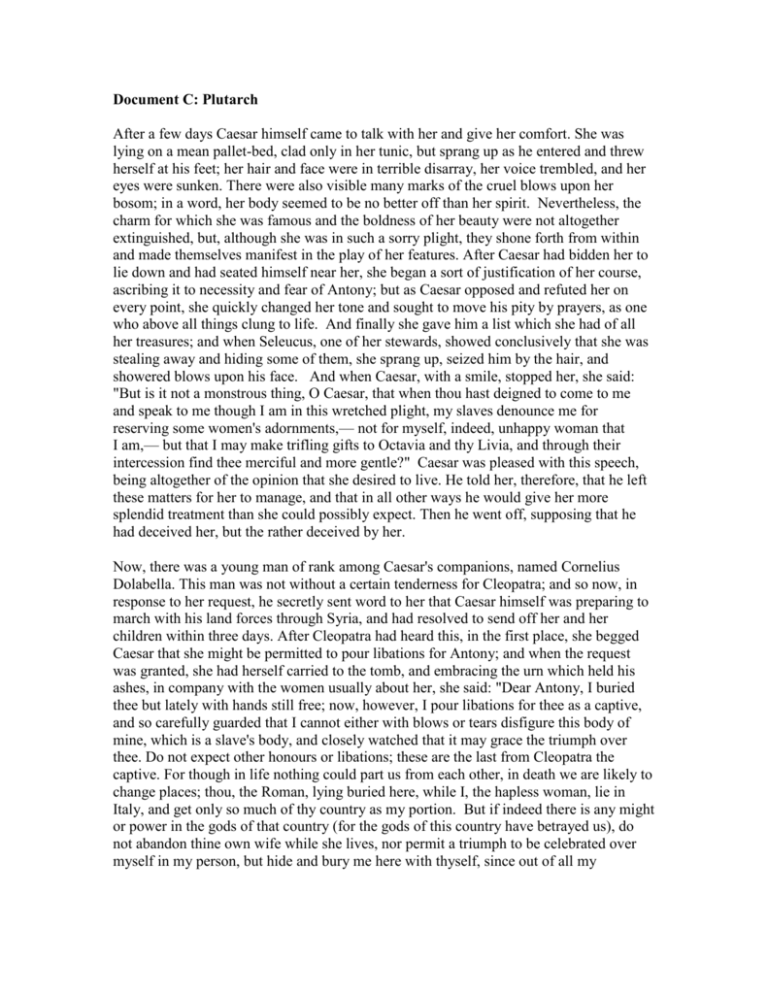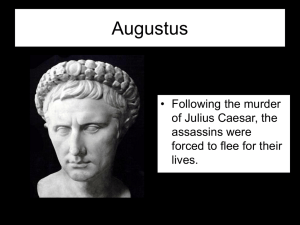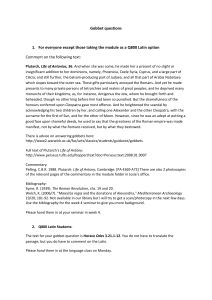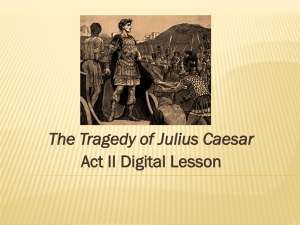Cleopatra_ORIGINAL DOCUMENTS_0
advertisement

Document C: Plutarch After a few days Caesar himself came to talk with her and give her comfort. She was lying on a mean pallet-bed, clad only in her tunic, but sprang up as he entered and threw herself at his feet; her hair and face were in terrible disarray, her voice trembled, and her eyes were sunken. There were also visible many marks of the cruel blows upon her bosom; in a word, her body seemed to be no better off than her spirit. Nevertheless, the charm for which she was famous and the boldness of her beauty were not altogether extinguished, but, although she was in such a sorry plight, they shone forth from within and made themselves manifest in the play of her features. After Caesar had bidden her to lie down and had seated himself near her, she began a sort of justification of her course, ascribing it to necessity and fear of Antony; but as Caesar opposed and refuted her on every point, she quickly changed her tone and sought to move his pity by prayers, as one who above all things clung to life. And finally she gave him a list which she had of all her treasures; and when Seleucus, one of her stewards, showed conclusively that she was stealing away and hiding some of them, she sprang up, seized him by the hair, and showered blows upon his face. And when Caesar, with a smile, stopped her, she said: "But is it not a monstrous thing, O Caesar, that when thou hast deigned to come to me and speak to me though I am in this wretched plight, my slaves denounce me for reserving some women's adornments,— not for myself, indeed, unhappy woman that I am,— but that I may make trifling gifts to Octavia and thy Livia, and through their intercession find thee merciful and more gentle?" Caesar was pleased with this speech, being altogether of the opinion that she desired to live. He told her, therefore, that he left these matters for her to manage, and that in all other ways he would give her more splendid treatment than she could possibly expect. Then he went off, supposing that he had deceived her, but the rather deceived by her. Now, there was a young man of rank among Caesar's companions, named Cornelius Dolabella. This man was not without a certain tenderness for Cleopatra; and so now, in response to her request, he secretly sent word to her that Caesar himself was preparing to march with his land forces through Syria, and had resolved to send off her and her children within three days. After Cleopatra had heard this, in the first place, she begged Caesar that she might be permitted to pour libations for Antony; and when the request was granted, she had herself carried to the tomb, and embracing the urn which held his ashes, in company with the women usually about her, she said: "Dear Antony, I buried thee but lately with hands still free; now, however, I pour libations for thee as a captive, and so carefully guarded that I cannot either with blows or tears disfigure this body of mine, which is a slave's body, and closely watched that it may grace the triumph over thee. Do not expect other honours or libations; these are the last from Cleopatra the captive. For though in life nothing could part us from each other, in death we are likely to change places; thou, the Roman, lying buried here, while I, the hapless woman, lie in Italy, and get only so much of thy country as my portion. But if indeed there is any might or power in the gods of that country (for the gods of this country have betrayed us), do not abandon thine own wife while she lives, nor permit a triumph to be celebrated over myself in my person, but hide and bury me here with thyself, since out of all my innumerable ills not one is so great and dreadful as this short time that I have lived apart from thee." After such lamentations, she wreathed and kissed the urn, and then ordered a bath to be prepared for herself. After her bath, she reclined at table and was making a sumptuous meal. And there came a man from the country carrying a basket; and when the guards asked him what he was bringing there, he opened the basket, took away the leaves, and showed them that the dish inside was full of figs. The guards were amazed at the great size and beauty of the figs, whereupon the man smiled and asked them to take some; so they felt no mistrust and bade him take them in. After her meal, however, Cleopatra took a tablet which was already written upon and sealed, and sent it to Caesar, and then, sending away all the rest of the company except her two faithful women, she closed the doors. But Caesar opened the tablet, and when he found there lamentations and supplications of one who begged that he would bury her with Antony, he quickly knew what had happened. At first he was minded to go himself and give aid; then he ordered messengers to go with all speed and investigate. But the mischief had been swift. For though his messengers came on the run and found the guards as yet aware of nothing, when they opened the doors they found Cleopatra lying dead upon a golden couch, arrayed in royal state. And of her two women, the one called Iras was dying at her feet, while Charmion, already tottering and heavy-handed, was trying to arrange the diadem which encircled the queen's brow. Then somebody said in anger: "A fine deed, this, Charmion!" "It is indeed most fine," she said, "and befitting the descendant of so many kings." Not a word more did she speak, but fell there by the side of the couch. It is said that the asp was brought with those figs and leaves and lay hidden beneath them, for thus Cleopatra had given orders, that the reptile might fasten itself upon her body without her being aware of it. But when she took away some of the figs and saw it, she said: "There it is, you see," and baring her arm she held it out for the bite. But others say that the asp was kept carefully shut up in a water jar, and that while Cleopatra was stirring it up and irritating it with a golden distaff it sprang and fastened itself upon her arm. But the truth of the matter no one knows; for it was also said that she carried about poison in a hollow comb and kept the comb hidden in her hair; and yet neither spot nor other sign of poison broke out upon her body. Moreover, not even was the reptile seen within the chamber, though people said they saw some traces of it near the sea, where the chamber looked out upon it with its windows. And some also say that Cleopatra's arm was seen to have two slight and indistinct punctures; and this Caesar also seems to have believed. For in his triumph an image of Cleopatra herself with the asp clinging to her was carried in the procession. These, then, are the various accounts of what happened. But Caesar, although vexed at the death of the woman, admired her lofty spirit; and he gave orders that her body should be buried with that of Antony in splendid and regal fashion. Her women also received honourable interment by his orders. When Cleopatra died she was forty years of age save one, and had shared her power with Antony more than fourteen. 5 Antony was fifty-six years of age, according to some, according to others, fifty-three. Now, the statues of Antony were torn down, but those of Cleopatra were left standing, because Archibius, one of her friends, gave Caesar two thousand talents, in order that they might not suffer the same fate as Antony's. Source: http://penelope.uchicago.edu/Thayer/E/Roman/Texts/Plutarch/Lives/Antony*.html Document D: Cassius Dio She accordingly prepared a splendid apartment and a costly couch, and moreover arrayed herself with affected negligence,— indeed, her mourning garb wonderfully became her,— and seated herself upon the couch; beside her she placed many images of his father, of all kinds, and in her bosom she put all the letters that his father had sent her. When, after this, Caesar entered, she leaped gracefully to her feet and cried: "Hail, master — for Heaven has granted you the mastery and taken it from me. But surely you can see with your own eyes how your father looked when he visited me on many occasions, and you have heard people tell how he honoured me in various ways and made me queen of the Egyptians. That you may, however, earn something about me from him himself, take and read the letters which he wrote me with his own hand." After she had spoken thus, she proceeded to read many passionate expressions of Caesar's. And now she would lament and kiss the letters, and again she would fall before his images and do them reverence. She kept turning her eyes toward Caesar and bewailing her fate in musical accents. She spoke in melting tones, saying at one time, "Of what avail to me, Caesar, are these thy letters?" and at anyone, "But in this man here thou also art alive for me"; again, "Would that I had died before thee," and still again, "But if I have him, I have thee." Such were the subtleties of speech and of attitude which she employed, and sweet were the glances she cast at him and the words she murmured to him. Now Caesar was not insensible to the ardour of her speech and the appeal to his passions, but he pretended to be; and letting his eyes rest upon the ground, he merely said: "Be of good cheer, woman, and keep a stout heart; for you shall suffer no harm." She was greatly distressed because he would neither look at her nor say anything about the kingdom nor even utter a word of love, and falling at his knees, she said with an outburst of sobbing: "I neither wish to live nor can I live, Caesar. But this favour I beg of you in memory of your father, that, since Heaven gave me to Antony after him, I may also die with Antony. Would that I had perished then, straightway after Caesar! But since it was decreed by fate that I should suffer this affliction also, send me to Antony; grudge me not burial with him, in order that, as it is because of him I die, so I may dwell with him even in Hades." Such words she uttered, expecting to move him to pity, but Caesar made no answer to them; fearing, however, that she might destroy herself, he exhorted her again to be of good cheer, and not only did not remove any of her attendants but also took special care of her, that she might add brilliance to his triumph. This purpose she suspected, and regarding that fate as worse than a thousand deaths, she conceived a genuine desire to die, and not only addressed many entreaties to Caesar that she might perish in some manner or other, but also devised many plans herself. But when she could accomplish nothing, she feigned a change of heart, pretending to set great hopes in him and also in Livia. She said she would sail of her own free will, and she made ready some treasured articles of adornment to use as gifts, in the hope that by these means she might inspire belief that it was not her purpose to die, and so might be less closely guarded and thus be able to destroy herself. And so it came about. For as soon as the others and Epaphroditus, to whose charge she had been committed, had come to believe that she really felt as she pretended to, and neglected to keep a careful watch, she made her preparations to die as painlessly as possible. First she gave a sealed paper, in which she begged Caesar to order that she be buried beside Antony, to Epaphroditus himself to deliver, pretending that it contained some other matter, and then, having by this excuse freed herself of his presence, she set to her task. She put on her most beautiful apparel, arranged her body in most seemly fashion, took in her hands all the emblems of royalty, and so died. No one knows clearly in what way she perished, for the only marks on her body were slight pricks on the arm. Some say she applied to herself an asp which had been brought in to her in a water-jar, or perhaps hidden in some flowers. Others declare that she had smeared a pin, with which she was wont to fasten her hair, with some poison possessed of such a property that in ordinary circumstances it would not injure the body at all, but if it came into contact with even a drop of blood would destroy the body very quietly and painlessly; and that previous to this time she had worn it in her hair as usual, but now had made a slight scratch on her arm and had dipped the pin in the blood. In this or in some very similar way she perished, and her two handmaidens with her. As for the eunuch, he had of his own accord delivered himself up to the serpents at the very time of Cleopatra's arrest, and after being bitten by them had leaped into a coffin already prepared for him. When Caesar heard of Cleopatra's death, he was astounded, and not only viewed her body but also made use of drugs and Psylli in the hope that she might revive. These Psylli are males, for there is no woman born in their tribe, and they have the power to suck out any poison of any reptile, if use is made of them immediately, before the victim dies; and they are not harmed themselves when bitten by any such creature. They are propagated from one another and they test their offspring either by having them thrown among serpents as soon as they are born or else by having their swaddling-clothes thrown upon serpents; for the reptiles in the one case do no harm to the child, and in the other case are benumbed by its clothing. So much for this matter. But Caesar, when he could not in any way resuscitate Cleopatra, felt both admiration and pity for her, and was excessively grieved on his own account, as if he had been deprived of all the glory of his victory. Source: http://penelope.uchicago.edu/Thayer/E/Roman/Texts/Cassius_Dio/51*.html Document E: Scholarly Journal Hughes-Hallett (1997:139-140) has indeed argued convincingly that the snakebite theory is problematic. Various North African adders could have been used — in addition to Cerastes vipera (the so-called “Cleopatra’s asp”), there are also Vipera berus, Vipera aspis and Cerastus cornutus (the “horned” adder). However, in the case of each of these species the area surrounding the bite is characterised by severe pain, swelling and subcutaneous bleeding. Death ensues only in cases showing prominent signs and symptoms, while Cleopatra, as we have seen, had no significant bite marks. On the other hand, if the snake were not an adder but a cobra (for example the Egyptian cobra, Naja haja, locally known as uraeus), an inconspicuous bite could swiftly lead to paralysis and death. The cobra was the emblem of the Egyptian royal house as well as being the sacred creature associated with the goddess Isis. Thus the cobra may well have had a particular symbolic significance for Cleopatra. Galen (De theriaca ad Pisonem c.8 K.XIV.237) also notes that death by snakebite was a recognised (and humane) method of execution in ancient Alexandria. Again, however, in order to bring about the speedy deaths of three adults, the cobra would have had to be at least 1.5, if not 2 meters in length (HughesHallett 1997:140). M. A. Wes (2000:222-224) has offered the interesting hypothesis that the snakebite theory could have originated as a result of popular misunderstanding at the time of Octavian’s triumphal parade through Rome. An image of Cleopatra was displayed in the procession, wearing the robes of Isis and with the goddess’s traditional armlet (a coiled snake) on her forearm (Fig. 13). Roman spectators ignorant of Egyptian religious symbolism might have interpreted this as suggesting that her death had been caused by a snake — in fact, three Roman poets who were contemporaries of Cleopatra and could have witnessed the triumphal procession (Virgil, Horace and Propertius2), mentioned snakes when referring to her death. Plutarch (Antony c.86) also mentions the possibility that Cleopatra and her handmaidens could have died of poison hidden in a hollow hairpin. For parallels one need not turn to the plots of James Bond films — the Greek orator Demosthenes, the Carthaginian general Hannibal and the Eastern king Mithradates spring to mind as famous figures who committed suicide in a similar way.3 A very virulent poison, taken first by Cleopatra and then by Charmian and Iras, could then explain how they died so swiftly and without any wounds. In many ways this simpler explanation is more acceptable than the exotic theories concerning snakebite. It has been alleged that the first Pharaoh, Menes, kept a garden of poisonous plants, and that the Egyptian royal house probably remained wellinformed about the effects of various poisons (Bloch 1987:761-763). As has been mentioned, Roman authors in particular alleged that Cleopatra had a superior knowledge of poison and its effect on human victims (Plutarch, Antony c.71). In the absence of more detailed clinical information it is difficult to speculate about which poison may have been used. However, the fact that the three women apparently died swiftly and without much pain or discomfort suggests an agent which would cause acute paralysis, or a cardiotoxin. Monkshood (containing aconite), for example, which was used by the emperor Nero (among others) to poison his victims, falls in this category (Retief & Cilliers 2000:15-17). Source: Scholarly journal: Francois Retief and Louise P. Cilliers, “The Death of Cleopatra,” Acta Theologica, Vol.26: 2 (2006). 85- 87. http://historyoftheancientworld.com/2010/10/the-death-of-cleopatra/









